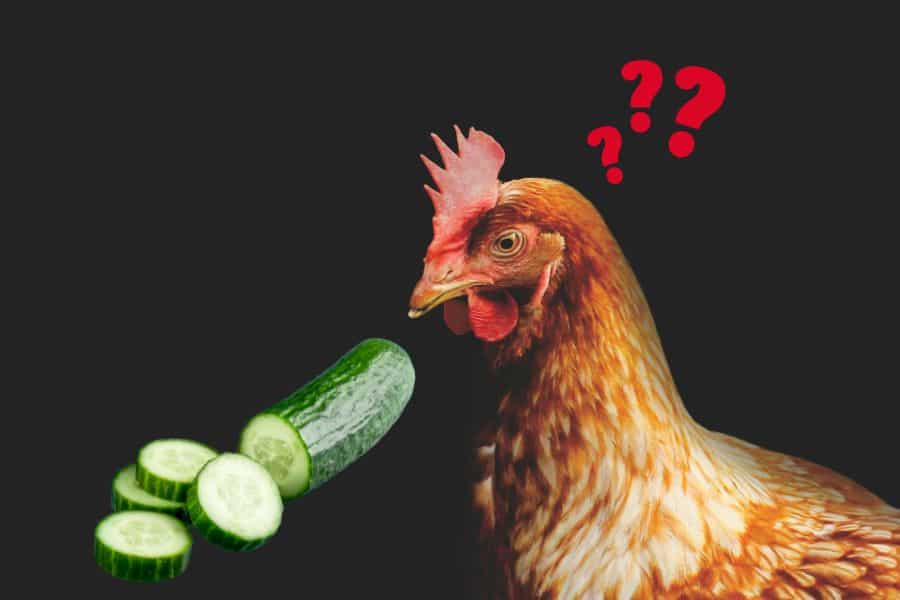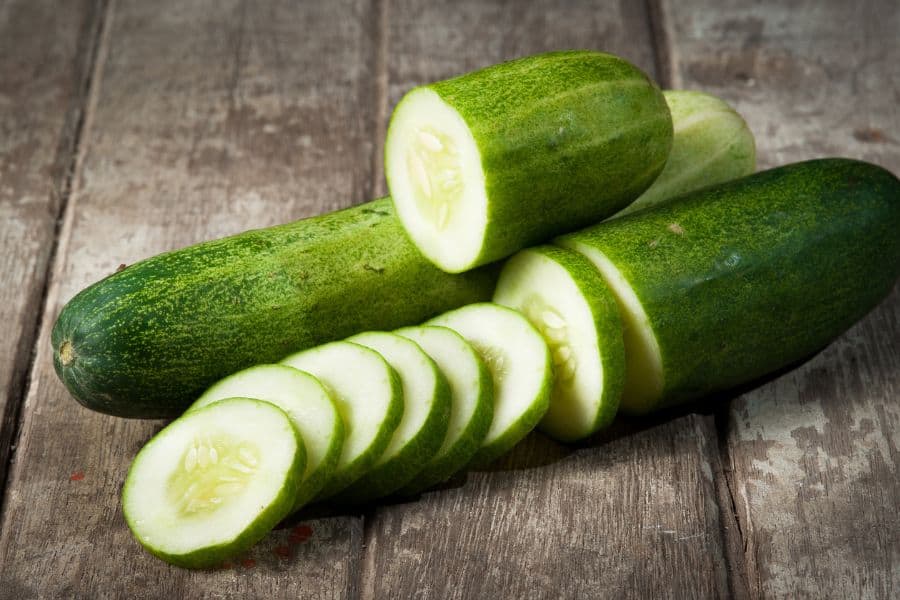Chickens are famous for not being picky about what they eat – these omnivores will nibble on everything and anything you give them.
And while most poultry farmers go for chicken feed as a main source of nutrition for their beloved chicken flock, there is no rule that says they should be fed only commercial food.
Yes, commercial food has a lot of macro and micronutrients that will keep the chickens healthy but put yourself in the chicken’s position – would you want to eat the same dish your whole life? Probably not – diversity is key to a healthy and happy life.
A part of this diversity can be cucumbers. This fruit (botanically though, culinary, we consider them a vegetable) is rich in water, and other nutrients chickens need in their diet. Keep reading on to find out why you should give your flock this healthy snack!
What Is in a Cucumber?
You’ve probably heard that cucumbers are mostly water. However, they’re not 100% water which means they contain other macros that may be beneficial for your chickens.
Water is technically a micronutrient because it doesn’t provide any energy, unlike proteins or fats. Still, since most living beings need to consume large quantities of it, water can be considered a macronutrient!
100 grams of raw cucumbers contain:
- 15 kcal calories
- 95 % water
- 0,65 grams of proteins
- 3,6 grams of carbohydrates
- 0,5 grams of fibers
- 0,1 grams of fat
- 1,7 grams of sugar
As you can see, cucumbers are not a macro-heavy type of food. Still, they provide your chickens with some protein (up to 4% of their necessary daily intake), sugar (up to 6%), and fiber.
Now let’s take a look at how cucumbers fare in the vitamin and mineral value department:
- Vitamin A is necessary for normal growth and reproduction. It has many benefits for your chickens. It boosts the immune system and bone development and helps regenerate cells.
- Vitamin B6 is crucial in helping chickens break down and efficiently use protein.
- Vitamin C is similar to vitamin A. It has many benefits but one of the most important is reducing heat stress.
- Vitamin K helps chickens’ bodies process calcium and vitamin D. It also helps with blood health, regulating blood clots in chickens.
- Manganese aids reproduction, growth and nutrient absorption, recovery from injuries, and prevents perosis.
- Copper enhances the structure and functionality of the intestines and promotes a balanced microbiome.
Are Cucumbers Good for Chickens?
We already kind of answered this in the previous section, so you won’t be surprised to find out that cucumbers are good for chickens and should be a part of their diet.
Cucumbers contain a lot of goodies such as water, protein, vitamin A, vitamin K6, and calcium. Together, they will improve your chickens’ lives in many different ways.
Before discussing the cucumber benefits in more detail, we must note that all treats shouldn’t make up more than 10% of the total diet.
Cucumbers Keep Chickens Hydrated
If we don’t count oxygen, water is the most important part of a chicken’s diet since it helps it digest food, get rid of food waste, and produce more eggs.
Cucumbers, with their 95% of water content, are a great way to ensure your chickens’ bodies are hydrated enough to perform the above-mentioned processes efficiently.
Cucumbers Help Chickens Regulate Body Temperature
As you probably know, chickens are sensitive to heat stress since they don’t have sweat glands. So when they need to cool down and try to reach optimal body temperature, they pant and spread their wings. This increase in activity, of course, means an increase in the need for water intake. It is especially true for chickens living in areas with hotter climates.
And while you will satisfy their water requirements with clean drinkable water, you can also provide your flock with some cucumbers here and there. A couple of cool cucumbers in the middle of the summer might be the best snack for them to keep their body’s temperature in check.
Cucumbers Improve Chickens’ Digestive System
Dietary fiber is a vital component in the digestive process of chickens. It helps turn food into nutrients and keeps bowel movements regular. It means that it also prevents constipation and promotes a healthy gut microbiome.
A chick with a healthy gut microbiome is a happy chick since gut microbiota helps control its immune system and destroy detrimental bacteria.
What does a chicken need to do to get some fiber? Let it eat a cucumber containing 0.5 grams of fiber for every 100 grams.
Cucumbers Enhance The Strength of Chickens’ Bones
Cucumbers contain calcium, an essential nutrient that keeps your chickens healthy. It helps maintain a healthy nervous system and improves communication between the brain and other parts of the chicken’s body.
It plays a crucial role in keeping the chicken bones strong and facilitating easier muscle mobility. Calcium is very effective at these actions when it comes along with potassium and magnesium. And guess which fruit/vegetable also contains the latter two minerals?
Cucumbers Boost Chickens’ Immune System
The immune system is responsible for defense against the unwanted effects of internal and external biological or chemical factors to which it is exposed.
That is, against everything that could have a negative impact on it. In order for it to properly function, it needs certain antioxidants such as vitamins A, C, and E, beta carotene, selenium, copper, iron, and zinc.
Many of these antioxidants, like vitamins A, C, beta carotene, and copper, are a part of the cucumber’s nutrient package. This means that consuming this fruit will have boosting effects on the immune system of the chickens.
Can Chicken Eat Cucumber Peels?
As people are getting more and more conscious when it comes to health and longevity, they’re avoiding anything that could be detrimental to health and dreams of reaching old age.
Unfortunately, in recent times, cucumber peels have been demonized as a type of food that is toxic for consumption since it allegedly contains a lot of pesticides.
These accusations prompted a lot of people to stop using it not only in their own diet but in the diets of their chicken as well. Cucumber peels might contain some amount of pesticides, but you can easily remove them by thoroughly washing the cucumber’s skin. After you wash it, you’re more than free to feed peels to your flock.
Moreover, you should definitely do this because cucumber skin is loaded with the vitamins and minerals mentioned in this article. If you want your chickens to get the maximum out of their cucumber snack and enjoy many of its benefits, don’t waste anything!
Can Chickens Eat Cucumber Leaves?
Similarly to cucumber fruit, cucumber leaves are a food that is safe for chickens.
The same goes for the seeds, vines, and stems. Chickens will definitely prefer fresh fruits over other parts since fruits are better tasting.
Still, they won’t resist keeping their beaks closed around other stuff, especially if they’re hungry.
You should give them leaves, seeds, and stems because these parts are loaded with cucurbitacin. It is a bitter-tasting compound that has anti-inflammatory, antioxidant, antimalarial, and antimicrobial properties.
Before giving them leaves, don’t forget to wash them with cold water to remove any potential residue of pesticides.
We also need to note that you shouldn’t be feeding them moldy or decaying leaves, as this might be harmful to their health.
Can Baby Chickens Eat Cucumbers?
Most types of food that can be consumed by an adult animal can also be eaten by a baby, and this is definitely true for cucumbers and chickens.
Although baby chickens are rather delicate creatures with sensitive digestive systems, cucumber treats can be added to a good quality chicken starter.
As is the case with other types of treats, they should not exceed more than 5% of your baby chickens’ feed. They should also be avoided in the first couple of weeks after hatching.
After this period, you should start feeding baby chickens cucumbers because of all the cucumber benefits we have listed in some of the previous sections.
Although cucumbers aren’t particularly hard, you should still cut and chop them up to small enough pieces for your babies to properly enjoy their nutritious snacks.
Is There Such a Thing as Too Many Cucumbers?
Earlier in the article, we said treats and snacks should be limited to 10% of your chicken’s diet. We also said that cucumbers are a part of the snack group, meaning you should include other healthy foods when you want to treat your flock.
Having your chickens munching only on cucumbers will result in them missing out on a lot of other nutritious stuff!
Yes, we know that chickens like cucumbers and cucumbers aren’t high in calories or sugars, so it’s hard to overeat them, but you shouldn’t push the limits. Remember what we said at the beginning – diversity is key!
Also Read:
Conclusion
The answer to the question “Can chickens eat cucumbers?” is a definitive yes! Cucumbers won’t provide your hens with a lot of fats or carbs but will help them reach their necessary intake of proteins, fibers, and sugar.
More and most importantly, cucumbers are basically water in a solid state! You know how important water is for chickens’ overall health and egg production!
And let’s not forget about the micronutrients such as vitamin K, C, copper, manganese, or beta-carotene. They all are key players in maintaining a healthy and happy flock.
All in all, you can’t go wrong with cucumbers – as long as you do it in moderation!


